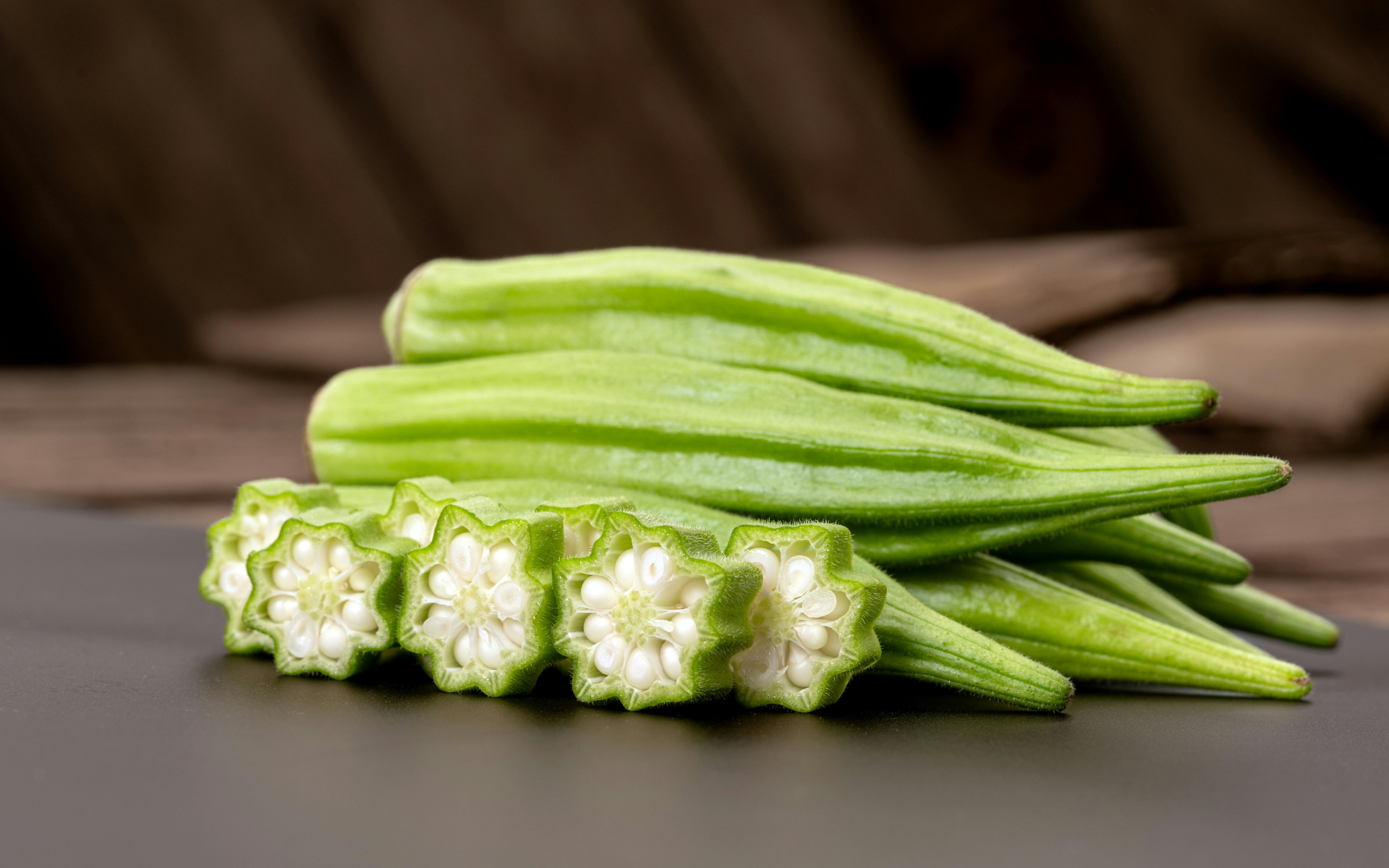Okra Gel
Terrain Based
Nutritional Profile of Okra Gel
Okra Gel is made by soaking or lightly simmering okra pods until they release a thick mucilage. This mucilage coats and hydrates dry or irritated mucosal surfaces especially in the mouth, esophagus, stomach, and small intestine. Unlike chia or flax, okra is deeply soothing, mineral-rich, and anti-inflammatory, making it ideal when dryness has progressed into irritative or inflammatory friction.
-
👉 Tastes describe the initial impression a food or herb leaves on the tongue, and they reveal its deeper actions in the body, shaping digestion, circulation, and tissue response.
Sweet (Mild) - Provides gentle nourishment that supports mucosal recovery without stimulating irritation or inflammation.
Bland - Forms mucilage when hydrated, coating and adhering to dry or irritated membranes to restore moisture, reduce friction, and protect surface tissues.
-
Moistening / Demulcent
Okra forms a mucilaginous gel when hydrated, which adheres to epithelial surfaces and restores moisture to dry or irritated tissues by creating a protective hydrating film.Stabilizing - Okra calms terrain overactivity by buffering acids, reducing inflammatory friction, and soothing irritated membranes without suppressing digestive function.
Softening / Emollient - Okra relaxes and softens tissues that have become tight, dry, or reactive by reducing friction and improving the glide between mucosal or epithelial surfaces.
Circulating (mild) -Okra gently supports movement of fluids and digestive secretions without stimulating heat, helping motility resume when dryness and irritation have inhibited flow.
Heavy - Okra’s mucilage slows the passage of food through the digestive tract, allowing better nutrient absorption and stabilizing blood sugar by dampening glucose spikes.
-
Low calories + low carbohydrate + high phytonutrient density
→ Provides hydration and repair without adding metabolic burden, heaviness, or congestion.High soluble fiber (mucilage + pectin)
→ Holds water in the gut, coating and hydrating mucosa while stabilizing blood sugar and reducing dryness-driven irritation.Moderate plant-based protein
→ Gently supports tissue rebuilding without creating digestive stagnation or irritation.Rich in minerals (calcium, magnesium, potassium, manganese)
→ Replenishes electrolytes and improves mucosal moisture retention, elasticity, and comfort.Antioxidant phytonutrients (quercetin, flavonoids)
→ Reduce inflammatory friction and support epithelial repair. -
Mucilage polysaccharides
→ Form a protective gel barrier over mucosal surfaces, reducing friction and irritation and restoring hydration.
Affinity: Oral mucosa, esophagus, stomach, small intestine.Pectin (soluble fiber)
→ Supports epithelial repair and strengthens the gut barrier while slowing glucose absorption to prevent mucosal dehydration from blood sugar swings.
Affinity: Small intestine + metabolic/endocrine system.Magnesium
→ Relaxes smooth muscle tension and reduces spasms in the GI tract while improving moisture regulation in tissues.
Affinity: Digestive tract (motility) + muscular tone regulation.Calcium
→ Supports structural repair of epithelial tissue and helps maintain mucosal integrity.
Affinity: Mucosal lining + tissue regeneration.Potassium
→ Enhances intracellular hydration and fluid balance, helping dry tissues retain moisture.
Affinity: Cellular hydration + mucosal surfaces.Quercetin + flavonoids
→ Reduce inflammatory signaling in epithelial tissue and decrease irritation-driven heat.
Affinity: Digestive mucosa + immune modulation.
-
👉 Indicated patterns describes the functional state of the organs or tissues.
Dry Mucosa + Irritative (Primary Indicated Pattern)
A digestive terrain where mucosal surfaces are dry, raw, or inflamed, often with burning, acidity, or friction due to lack of protective mucus.
Examples: Acid reflux / burning esophagus, Raw, irritated stomach lining (gastritis-like feeling), Dry throat or burning sensation when swallowing, Irritation that worsens with spicy, acidic, or dry foods
Okra forms a soothing mucilage gel that coats and hydrates mucosal surfaces, reducing friction and irritation and restoring a protective slippery barrier that allows tissues to heal.
-
Skin barrier repair (Dry mucosa / Dry skin / Atrophic tissue state)
Okra gel acts as a hydrating polysaccharide film on the skin, reducing transepidermal water loss and allowing damaged skin barrier cells to retain moisture.
Helps with: Dry, tight, flaking skin, Post-peel or post-retinoid sensitivity, Barrier impairment (over-exfoliation, dehydration)
The mucilage forms a hydrating seal on the surface, similar to aloe but thicker and more cushioning.
Anti-inflammatory (Irritative + Congestive Heat)
Okra polysaccharides and flavonoids calm heat and surface irritation.
Helps with: Red, irritated skin, Burning sensation / sensitized areas
Mucosal soothing (Oral + vaginal mucosa)
This is where okra becomes a standout.
Helps with: Burning mouth syndrome (dry mucosa → irritation → heat), Vaginal dryness or irritation (postpartum, low estrogen terrain), Anal fissures (dry stool → friction injury)
Mucilage adheres to epithelial cells → protective hydrating film → reduces friction and burning.
Hair + Scalp conditioning (Tension + Dryness)
Okra mucilage binds to keratin and smooths the hair shaft.
Helps with: Dry/brittle hair, Scalp dryness or irritation, Frizz and breakage
Okra gel behaves similarly to flax or aloe hair gel but with more slip and more humectant effect.
-
Okra Gel (therapeutic method):
Slice fresh okra pods lengthwise (3–4 pods).
Soak in room-temperature water overnight (12 hours).
→ For deeper gel or mucilage release: lightly simmer 5–7 min.Use therapeutically when:
throat is raw or burning
dry mouth / mucosal dryness
reflux / gastritis / esophageal inflammation
post-antibiotics mucosal depletion
Dose:
2–4 tbsp gel on an empty stomach, 1–2x/day
(or sip slowly as a drink if used for reflux or gastritis). -
The mucilage may slow or reduce absorption of oral medications or supplements.
→ Take medications 1–2 hours away from Okra gel.If diabetic medications or insulin are used, monitor blood sugar, okra can lower postprandial glucose levels.
Avoid pairing with extended-release medications (the gel may interfere with release timing).
-
Traditional Sources
Malvaceae family demulcent tradition (same family as marshmallow root)
Ayurvedic use of Bhindi for cooling, moistening, digestive soothing
Southern folk medicine — okra water for stomach heat and acid irritation
Modern Research
Food Hydrocolloids Journal — mucilage structure, viscosity, gel barrier function
Journal of Nutrition — okra polysaccharides improve glycemic control
International Journal of Biological Macromolecules — okra pectin supports epithelial repair
Nutrients Journal — quercetin (found in okra) reduces inflammatory cytokines
Journal of Pharmacognosy & Phytochemistry — mucilage + gut barrier function
African Journal of Traditional Medicine — okra as cooling demulcent for gastritis/ulcers



